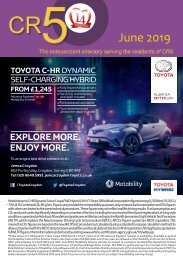CR5 Issue 175 January 2020
A local independent community magazine delivered free to 11,800 homes every month in the CR5 postcode. Contains local business advertising, interesting reads, Competitions, What's on in the Community and Puzzles.
A local independent community magazine delivered free to 11,800 homes every month in the CR5 postcode.
Contains local business advertising, interesting reads, Competitions, What's on in the Community and Puzzles.
You also want an ePaper? Increase the reach of your titles
YUMPU automatically turns print PDFs into web optimized ePapers that Google loves.
The downside is that the charging
technology tends to make PHEVs
pricier than other hybrids, and if
you have no means to charge the
battery yourself, you might as
well save that initial cash and go
for a normal hybrid.
FREQUENTLY ASKED
QUESTIONS
What is a self-charging hybrid?
In truth, there’s very little to
separate a ‘self-charging’ hybrid
from a regular hybrid. They still
use a single or pair of electric
motors to assist the petrol (or,
in small numbers, diesel) engine,
and they can’t be plugged in to
top up the batteries, either.
So how do you charge them?
Most hybrids come with the
option to use some of the
engine’s power output to charge
the batteries, therefore reserving
some electric power for later
use. In addition, nearly all hybrids
harness the energy generated
when braking and coasting,
pushing this kinetic energy into
the batteries. So really, a ‘selfcharging’
hybrid is just a hybrid
car that can’t be plugged into the
mains.
Would a hybrid benefit me?
This really depends on your daily
journeys. Those who do shorter
trips day-to-day are definitely
candidates for the swap to a
hybrid, as the vehicle can run on
all-electric power alone, meaning
that emissions are practically zero
and overall consumption of fuel
will be as low as possible.
In contrast, if you’re travelling
further afield more regularly
while at higher speeds, then a
conventionally powered car may
still be better. Hybrids struggle
to run on electric power at
motorway speeds and for long
distances, after which the smaller
combustion engine is left to
deal with propulsion all by itself,
resulting in higher emissions and
poor fuel economy.
Are hybrid cars reliable?
Despite a complex powertrain and
the multitude of new technologies
incorporated into a hybrid’s
setup, they are as reliable as a
conventional car. In fact, many
older hybrids have achieved high
mileages with little to no fuss,
and because of the stronger
regeneration you get from a hybrid
there’s less stress on the brakes
too.
Do you get a plug-in grant?
Sadly, no – in March 2019 the
government announced that it
was axing the plug-in grant for
hybrid vehicles following a surge
in their popularity. Only all-electric
vehicles now qualify for the grant.
Are they eligible for exclusion
from low emissions zones?
Some hybrids are eligible for
an exclusion from London’s
low-emissions zone charge, but
the rules are far more stringent
than previously. Now, only hybrid
cars which emit less than 75g/km
CO2 and have a minimum zeroemissions
(or all-electric) range of
20 miles will be completely exempt
from the charge. As a result, older
vehicles may not get the discount.
Plus, in 2021, London’s Ultra Low
Emissions Zone is set to extend to
the north and south circular, and
no hybrids will get an exemption
from the charge.
To advertise call Lucy on 01737 557888 or 07703 209292
81
















